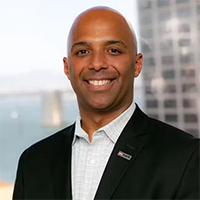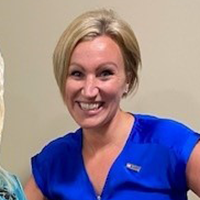
Talent acquisition 101: Building a small business dream team

5 tips for creating (and sticking to) a holiday budget

Serving on a board can help you improve your leaderships skills and help you build a strong professional network. Both can help your career. According to a Harvard Business Review study, serving on a board can help you get promoted to a CEO position and may improve your annual pay.
There are a few things to know before you join a board including what types of boards exist, what types of roles you can have serving on a board and how to make your service really have an impact. We spoke with three U.S. Bank employees who shared their board experience:
All publicly traded companies have a board of directors as well as many private and nonprofit organizations. The primary role of a board is to act as a fiduciary, supervising the company to protect their interests and to drive them forward.
There are several different kinds of boards, some of which draw on your professional expertise (advisory, governing) while others rely on your influence and resources to benefit the organization financially (fundraising). Some boards have paid positions while many others, especially nonprofit boards, have volunteer positions.
Either way, serving on a board is a great way to learn first-hand how other businesses run and to grow your own skills.
“I was the youngest person on the board by 10-15 years. And the other members were executives. I was learning and observing, and I got to see through their eyes how things work. I got to do a lot of networking and skill building because I had access to these executives.” Kara Irvin
“One of the things I really enjoy is being a mentor to new employees. Young people don’t have a lot of professional experience and I can bring that to them through my board experience.” Alexander Sauced
Most boards of directors include a chair, vice chair, secretary and treasurer, with additional positions available depending on the needs of the organization. In addition, most board work is done through committees such as fundraising, marketing, governance, etc... A company’s CEO or CFO may also sit on the board to help guide decisions, but for the most part boards are made up of a majority of outside, or independent, directors.
This variety of roles provides opportunities for you to use your skills to the benefit of the organization and the communities they serve.
“I connect a lot with my business contacts in the community. I’m constantly looking for partnerships for the organization so we can offer more internship opportunities for the students. That, along with providing financial literacy to the interns, are my primary roles.” Andrew Parsons
“One of the big roles of the board is funds distribution, where we vet our nonprofit partners and decide how much to give each organization. We’re looking for where we can make the biggest impact. It's empowering because you’re helping to make those decisions.” Kara Irvin
Actively participating on a board of directors comes with the satisfaction that you’re helping to make a difference. You can play a key role in how a company guides its operations and that can be meaningful for you and the communities the organization serves.
“I am super passionate about giving back to the Inland Empire. I grew up here. I wanted to serve the community I live in. I’m also passionate about climate change. I have 3 kids and I want to make sure that the world we live in is suitable for my kids. So, I do everything that I can to make sure that we’re doing our part to lower the impact we have on the environment.” Alexander Saucedo.
“A student called with a bunch of questions following a discussion we held. We did an hour and half presentation and then later he connected with me through LinkedIn, and I spent another two hours speaking with him. He was so engaged and showed so much interest. He shared his story and some of his struggles and how being a part of Genesys Works is a game changer for him because it’s creating a pathway of opportunities.” Andrew Parsons
So how do you get started? Think about the type of board you’d like to join and what role you want to play on the board. Consider your career goals and how your board service might help you advance your goals.
Then start building your credentials. Identify the skills you can bring to a board position and highlight that on your resume while continuing to develop those skills. Consider joining a professional association – a great place to build your expertise.
Start networking: reach out to your professional contacts, including members of your professional association, to ask them about their experiences with boards.
And above all else start volunteering. Look to see if your employer offers corporate volunteer events or ask friends and family about the causes they are passionate about. Once you find your passion and start volunteering, network within the organization to see if there are leadership positions available.
“I was asked to join the board! But it started out with me donating a lot of time with the United Way. My family was a recipient of their services when I was younger. We couldn’t have survived without the help of the community and that’s first and foremost why I give back.” Kara Irvin
“I kind of fell into GRID Alternatives. I did a volunteer day with U.S. Bank many years back and it was eye opening for me, so I met with the executive director and asked if they were looking for board members and they happened to be looking for somebody who specialized in banking and finance." Alexander Saucedo
“Some people want to be on a board to check off a box on their LinkedIn page, but that won’t work. You have to align your board service to your passion. I don’t look at it like a board seat, it’s about making a difference in the youth of Oakland, and I wear that ambassador badge proudly.” Andrew Parsons
Serving on a board of directors can help you grow your career, but it comes with a lot of responsibility. Above all else, being a great board member means putting the needs of the organization before your own, but by doing so, you will know that you have helped the organization make a positive impact with the communities they serve and that can be the best reward of all.
Want to know how to make the most out of your board service? Read 5 tips for being a great board member. Board service is just one way to grow your career. Whether you’re just starting out or you are a seasoned professional we have lots of career resources to explore.
About the contributors



Andrew Parsons is the district manager for the Bay Area at U.S. Bank. He is a board member with Genesys Works Bay Area, an organization that provides career pathways and opportunities for underserved youth in the Bay Area, California.
Kara Irvin is a Business Banking sales manager at U.S. Bank. She is the board chair for United Way of Whatcom County, an organization which fights for the financial stability of every person in Whatcom County, Washington.
Alexander Saucedo is a Wealth Management banker with U.S. Bank Wealth Management. He is a board member of GRID Alternatives Inland Empire, an organization that provides clean, renewable solar energy for low-income families and hands-on job training for workers in the Inland Empire, California.
Related content


